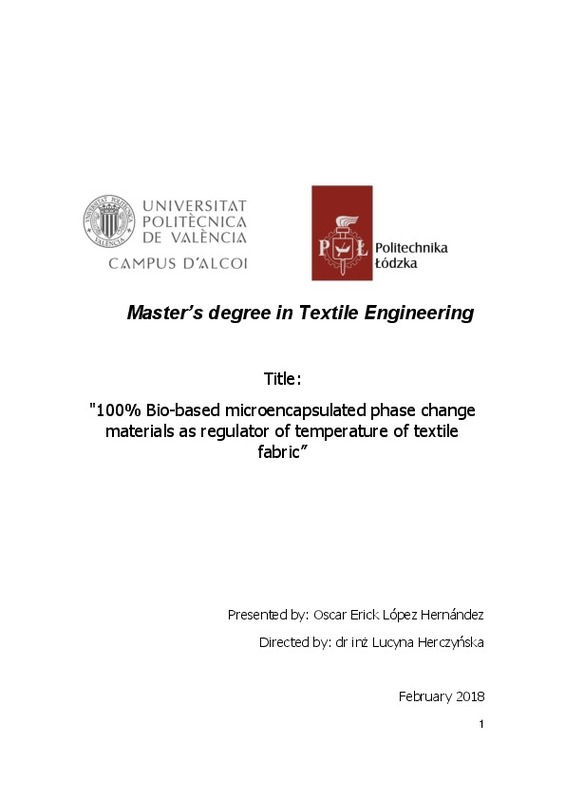JavaScript is disabled for your browser. Some features of this site may not work without it.
Buscar en RiuNet
Listar
Mi cuenta
Estadísticas
Ayuda RiuNet
Admin. UPV
100% Bio-based microencapsulated phase change materials as regulator of temperature of textile fabric
Mostrar el registro sencillo del ítem
Ficheros en el ítem
| dc.contributor.advisor | Gisbert Paya, Jaime
|
es_ES |
| dc.contributor.advisor | Bonet Aracil, María Angeles
|
es_ES |
| dc.contributor.advisor | Herczyńska, Lucyna
|
es_ES |
| dc.contributor.author | López Hernández, Óscar Erick
|
es_ES |
| dc.date.accessioned | 2018-10-05T11:20:47Z | |
| dc.date.available | 2018-10-05T11:20:47Z | |
| dc.date.created | 2018-06-27 | |
| dc.date.issued | 2018-10-05 | es_ES |
| dc.identifier.uri | http://hdl.handle.net/10251/109529 | |
| dc.description.abstract | [ES] Los materiales de cambio de fase (PCM) son muy útiles en muchos campos gracias a su capacidad para absorber y liberar energía térmica cuando es necesario. En este trabajo nos enfocamos en desarrollar Materiales de Cambio de Fase microencapsulados (microPCM) 100% Biodegradables para aplicarlos en textiles para regular su temperatura. Los candidatos perfectos para utilizar como PCM fueron el aceite de coco y la cera de abeja debido a su punto de fusión entre 15 ° C y 65 ° C que se utilizan en aplicaciones de confort térmico, donde el aceite de coco tiene 23 ° C y la cera de abeja 57 ° C más o menos dependiendo de la pureza del material. La gran cantidad de energía que el aceite de coco y la cera de abeja pueden absorber al cambiar sus fases fue también una propiedad muy importante para elegirlos. El método de microencapsulación utilizado en este trabajo fue la evaporación de disolvente. Se utilizaron diferentes disolventes y las diferencias de uso se describen en la parte experimental, como el efecto de usar diferentes velocidades de agitación, cantidad de núcleo y material de revestimiento y cantidad de disolvente. La caracterización de los microPCM se realizó mediante Microscopio Electrónico de Barrido (SEM), Calorímetro de Barrido Diferencial (DSC) y Termografía Infrarroja (IR). El SEM muestra que las microcápsulas se hicieron con éxito, el DSC muestra la cantidad de energía que pueden absorber y liberar y la cámara IR nos dio imágenes que muestran que los textiles modificados con microPCM pueden mantener por más tiempo la energía térmica dentro. | es_ES |
| dc.description.abstract | [EN] Phase Change Materials (PCM) are very useful in many fields thanks to their capacity to absorb and release heat energy when it is necessary. In this paper we focus on developing 100% Bio based microencapsulated Phase Change Materials (microPCMs) to apply them into textiles to regulate its temperature. The perfect candidates to use as PCMs were coconut oil and bee wax due to their melting point between 15°C and 65°C that are used in thermal comfort applications, where coconut oil has 23°C and bee wax 57°C more or less depending of the pureness of the material. The large amount of energy that coconut oil and bee wax can absorb when changing their phases was also a very important property to choose them. The method of microencapsulation used in this work was solvent evaporation. They were used different solvents and the differences of using them are described in the experimental part such as the effect of using different stirring speed, amount of core and shell material and amount of solvent. The characterization of the microencapsulated phase change materials were made by Scanning Electron Microscope (SEM), Differential Scanning Calorimeter (DSC) and Infrared Thermography (IR). The SEM shows that the microcapsules were made successfully, the DSC shows the amount of energy they can absorb and release and the IR camera gave us images that show the textile modified with microPCMs can keep for longer time heat energy inside. | es_ES |
| dc.format.extent | 99 | es_ES |
| dc.language | Inglés | es_ES |
| dc.publisher | Universitat Politècnica de València | es_ES |
| dc.rights | Reserva de todos los derechos | es_ES |
| dc.subject | Aceite de coco | es_ES |
| dc.subject | Cera de abeja | es_ES |
| dc.subject | Ácido poliláctico (PLA) | es_ES |
| dc.subject | Etil celulosa | es_ES |
| dc.subject | Quitosano (CH) | es_ES |
| dc.subject | Coconut oil | es_ES |
| dc.subject | Bee wax | es_ES |
| dc.subject | Polylactide (PLA) | es_ES |
| dc.subject | Ethyl cellulose | es_ES |
| dc.subject | Chitosan (CH) | es_ES |
| dc.subject.classification | INGENIERIA TEXTIL Y PAPELERA | es_ES |
| dc.subject.other | Máster Universitario en Ingeniería Textil-Màster Universitari en Enginyeria Tèxtil | es_ES |
| dc.title | 100% Bio-based microencapsulated phase change materials as regulator of temperature of textile fabric | es_ES |
| dc.title.alternative | Microcápsulas 100% biodegradables con materiales que cambian de fase como reguladoras de temperatura de textiles | es_ES |
| dc.type | Tesis de máster | es_ES |
| dc.rights.accessRights | Abierto | es_ES |
| dc.contributor.affiliation | Universitat Politècnica de València. Departamento de Ingeniería Textil y Papelera - Departament d'Enginyeria Tèxtil i Paperera | es_ES |
| dc.contributor.affiliation | Universitat Politècnica de València. Escuela Politécnica Superior de Alcoy - Escola Politècnica Superior d'Alcoi | es_ES |
| dc.description.bibliographicCitation | López Hernández, ÓE. (2018). 100% Bio-based microencapsulated phase change materials as regulator of temperature of textile fabric. http://hdl.handle.net/10251/109529 | es_ES |
| dc.description.accrualMethod | TFGM | es_ES |
| dc.relation.pasarela | TFGM\85467 | es_ES |
Este ítem aparece en la(s) siguiente(s) colección(ones)
-
EPSA - Trabajos académicos [5826]
Escuela Politécnica Superior de Alcoy






